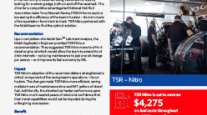Diesel Dips 4.4¢ to $4.648 a Gallon
This story appears in the June 30 print edition of Transport Topics.
The fuel price express took a holiday last week, as the average price of diesel dipped 4.4 cents a gallon to $4.648, and the price of gasoline declined for the first time in three months, according to the Department of Energy.
The fuel price express took a holiday last week, as the average price of diesel dipped 4.4 cents a gallon to $4.648, and the price of gasoline declined for the first time in three months, according to the Department of Energy.
“The effects of the price surge and the impact of the slowdown in demand from the economy are finally showing up at the pump and will probably continue to press prices lower,” Phil Flynn, an energy analyst at Alaron Research in Chicago, told Transport Topics.
Since reaching its historic high of $4.723 on May 26, diesel has now declined or re-mained unchanged in four successive DOE weekly price reports. Despite the dip last week, diesel is still $1.813 a gallon higher than a year earlier, trans-lating into an additional $362.60 for a 200-gallon purchase compared with the corre-sponding week in 2007.
Gasoline also declined, but only by 0.3 cent a gallon to a national average of $4.079, the U.S. Energy Information Administration said June 23 after its weekly survey of fuel-ing stations. However, this was the first decline since March 24.
Gasoline has increased 82 cents a gallon over the prior three months, leaving it $1.097 above year-ago levels.
Trucking burns an estimated 730 million gallons of diesel and 290 million gallons of gasoline each week.
One trucking executive said these small declines following unprecedented run-ups this year offered little relief.
“Every little bit helps, but that kind of price reduction is too little to help our company in any fundamental way,” Steven Maxson, vice president of equipment at Averitt Express Inc. in Nashville, Tenn., told TT.
“Changes that we made ourselves have helped a lot more,” Maxson continued. “We have made the decision to put [auxiliary power units] into every one of our sleepers. We also reduced the speed on our governors from 68 miles per hour to 65, and we also work hard daily with drivers to impress on them the importance of fuel economy.”
Maxson said the company has seen a significant reduction in its fuel use, though he said he could not specify by exactly how much.
Averitt ranks No. 26 on the Transport Topics 100 list of the largest for-hire carriers in the United States and Canada.
Meanwhile, crude oil closed at a record $139.64 on the New York Mercantile Exchange on June 26 and briefly traded above $140 for the first time, as Libya threatened to cut output and OPEC’s president said prices may reach $170 this summer, Bloomberg News reported.
Crude closed at the record price several days after Saudi Arabia said it would increase its daily output by 200,000 barrels to 9.7 million barrels next month and the United Arab Emirates announced it was ready to boost supplies, if needed.
Saudi Arabia and the U.A.E. are the biggest and third-largest producers in the OPEC oil cartel.
Back in the United States, DOE said June 25, oil inventories rose for the first time in six weeks because record fuel prices cut demand.
Oil stockpiles gained 803,000 barrels to 301.8 million barrel, while distillate inventories, which includes diesel, rose 2.82 million barrels to 119.4 million barrels in the week ended June 20, the seventh-straight increase.
The latest gain left distillate stockpiles 1.1% higher than the five-year average, DOE said.
EIA economist Neil Gamson said this was a positive sign for diesel prices for the rest of 2008.
“Combined with high distillate reserves and the current economy, we should see retail diesel falling over the course of the year to the $4.50 range,” he said.




